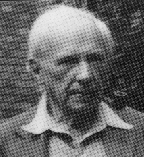 George Edward Moore was born in 1873, in England, one of eight children. The family soon
removed to London where the children were educated at Dulwich College. Moore's early tendency
was toward the classics and, when he went up to Cambridge (Trinity College) in 1892, it was to
read the classics.
George Edward Moore was born in 1873, in England, one of eight children. The family soon
removed to London where the children were educated at Dulwich College. Moore's early tendency
was toward the classics and, when he went up to Cambridge (Trinity College) in 1892, it was to
read the classics.
At Cambridge, Moore soon became friends with fellow student, Bertrand Russell. He, Russell, and J. E. McTaggart, a famous Cambridge professor, had numerous philosophical discussions throughout the student years; and Moore soon began to mix philosophy into his readings of classics. His earliest focus was in ethics, a field that, in English philosophy, had been dominated by the Hegelian (hence, strongly Idealist) thinking of F. H. Bradley. Moore won a prize fellowship, in 1898, on the basis of his dissertation, "The Metaphysical Basis of Ethics," and he began work on his first book, Principia Ethica, which was published in 1903. Also published in 1903, in Mind, was Moore's striking essay, "The Refutation of Idealism." The two works, along with Russell's essays of the period, laid the groundwork for a major assault on the Idealist tradition in philosophy and paved the way for the Realist, logic-oriented development of philosophical topics that came to dominate English philosophy throughout the first half of the 20th Century.
From 1904 until 1910, Moore lived and studied in Edinburgh, Scotland. His continuing interest in a Realist critique of Idealism led him directly into careful analysis of perception and other issues surrounding our knowledge of an external world. Moore lectured in London in 1910-11 and these pieces were published under the name Some Main Problems in Philosophy. In 1911, Moore became a Lecturer at Cambridge, and in 1925 he became Professor of Philosophy. Moore retired from this chair in 1938, passing it on to Ludwig Wittgenstein. He edited the journal Mind from 1921 until 1947.
The Cambridge scene was formidable, including Moore, Russell, Wittgenstein, and Frank Ramsey. Yet Moore's contributions are sometimes missed since he was not so widely known nor published as Russell. Moore's contributions tended to be personal --- an ever-present participant in discussions, striking in his analytic abilities, and insightful in his recognition and advancement of the era's central themes.
"A Defence of Common Sense"
"A Defence of Common Sense" was written in 1925, when Moore was assuming his chair in philosophy and was at the height of his powers. The essay can be read along with "Proof of an External World" (1939) and "Certainty" (1941). These essays loomed large in discussions between Moore, the American philosopher Norman Malcolm, and Wittgenstein. In fact, Wittgenstein was staying with Malcolm at Ithaca when he began but did not finish his book, On Certainty, which takes Moore's "Defense . . ." as its starting point. The "Defence" set the groundwork for Moore's future philosophical work, first by setting off clearly the differences in view between his position and those of others and, second, by suggesting a methodology of reference to "ordinary language." Just as Russell's logical analysis of language into verifiable "atomic" components came to dominate many of the philosophical discussions emanating from England, Moore's confidence in ordinary language dominated most of the other discussions.
There are five parts to the essay, the first part being by far the largest. In these, Moore attempts to (I) list a large number of propositions which he knows to be true with certainty; (II) deny that physical facts are logically dependent or causally dependent on any mental facts; (III) deny that the world was created by a god or, for that matter, that a god exists; (IV) suggest that the analysis of a proposition regarding material things is different from understanding it and, in fact, far less certain; and (V) suggest the same regarding the analysis of a proposition regarding other selves.
The first argument (I) is itself divided into five parts. (1) is a list of first-person propositions about Moore and the world which Moore thinks he knows true with certainty. (2) is a list of third-person propositions about other human beings and which mirror the list in (1) for themselves. In (3, p. 109) he takes up some concerns about how the word 'true' has been used by certain philosophers who might admit that, over all, these propositions can be spoken of as true but who, nevertheless, harbor various reservations that make them partially true or partially false. Moore asserts that his meaning of 'true' should register as wholly true. In (4, p. 111) he introduces the distinction between ordinary meaning and an analysis of meaning. And in (5, p. 112) he articulates philosophical disagreements with two kinds of position -- (A) which holds that none of these propositions is true and (B) which holds that, while these propositions may be true, we do not know their truth with any certainty.
| Back to Contents |